Unintended Consequences

The Canadian Vaping Association has warned about anti-vaping policy changes that will result in increased smoking rates and negative public health outcomes. It warned that the review by the Quebec Coalition for Tobacco Control (QCTC) could have serious unintended consequences.
The QCTC demanded a prohibition of all flavours apart from tobacco, a hike in tax on eliquids, a ban on certain packaging appearances and health risk warnings.
The CVA says it “has been a consistent advocate for strong youth protection measures and has worked with many governments to create a framework that balances youth protection with adult access. While our organization agrees with some of the recommendations put forward by QCTC, others will have the unintended consequence of both pushing ex-smokers back to smoking, as well as dissuading a number of current smokers from transitioning to a significantly less harmful product.”
After pointing out that a number of things the QCTC was calling for are already in place, the CVA added: “Time and again, it has been concluded that flavours being a driver for youth use is a fallacy. The data continues to show that flavours are imperative to adult adoption and continued cessation success, while flavour bans have shown to result in an immediate increase in smoking rates and traditional tobacco consumption.”
It referred to findings made by America’s Centers of Disease Control and Prevention, where 77% of children questioned didn’t state flavours as being the reason they tried vaping – being “curious” about vaping was the number one response.
Then, from a study by researchers at Yale University, the CVA quoted: “Adults who began vaping non-tobacco-flavoured e-cigarettes were more likely to quit smoking than those who vaped tobacco flavours.”
The CVA added: “To understand the harm that flavour bans cause to public health, we need only look to Nova Scotia. Immediately following the province’s decision to ban flavours, traditional cigarette sales experienced an unprecedented increase. Prompting the president of the Atlantic Convenience Store Association to release a statement urging Nova Scotia to reconsider the ban considering the dramatic spike in cigarette sales.”
Then, addressing the issue of increasing taxation, the CVA pointed to findings of a Minnesota study that found, “taxing vaping products would lead to an 8.1% increase in tobacco use and a smoking cessation decrease of 1.4%.”
The organisation concluded: “The CVA respects the QCTC’s mission to protect youth from nicotine experimentation and addiction. Yet, it is crucial that Canadian governments and QCTC alike understand that the CVA shares this goal. Independent vape businesses were created to solve the problem created by tobacco. Although often wrongfully viewed as an extension of tobacco, the sole purpose of the independent vape industry is to help adult smokers reduce their harm.”
Source: planetofthevapes

























































